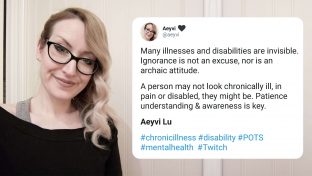Inspiration porn refers to the phenomenon of referring to disabled people as “inspirational” simply because of their disability.
I’m More Than Your Inspiration Porn — Disability And Loneliness

If I’d actually done something inspirational, then great — lavish praise upon me! But when you’re calling me inspirational for having a job, you’re suggesting that, in your mind, my life should be sitting at home crying and lamenting. I am a normal person, therefore it’s not inspirational when I do normal things. — Grace
Though being called an inspiration may sound like a compliment, the comment can feel degrading or humiliating to disabled people depending on the context.
- Inspiration porn tends to ignore the reality that disabled people are multi-dimensional individuals — not caricatures.
- Being used as inspiration porn is often frustrating to disabled people because it often shows inaccurate depictions of disability and also frequently devalues our lived experiences.
- The majority of disabled people appreciate it when able-bodied people act as allies, and that means taking us at our word and treating us with decency.
Struggling with loneliness or having a mental health crisis?
- Suicide Prevention Lifeline: 1-800-273-TALK (8255); Deaf or hard of hearing dial 711 before the number or connect via online chat
“Oh, what happened to you?” asked a stranger as I entered the church lobby.
She looked me up and down with a pitying expression, and I tightened my grip on my cane.
“I have a chronic illness,” I said.
I was starting to second guess if bringing my cane when visiting a new church for the first time was a good idea. “I pass out when I stand for too long and I have chronic pain, so my cane helps me get around better.”
“Oh. I’m sorry.” The woman took a step back and smiled after a few seconds.
Now, she looked at me with admiration. “Well, we’re just so happy that you could make it here to be with us today,” she said.
Now I’m inspiration porn. Great, I thought to myself.
Her apology didn’t bother me, but the way she spoke was patronizing and pitying all at once. Instead of continuing the conversation, I only muttered a ‘thanks’ and walked away.
As a disabled young woman, an encounter like this one isn’t unusual. Many disabled people are seen as inspiring and brave for simply existing.
Additionally, disability and loneliness are intrinsically linked. When someone makes a point of setting you apart from those around you, even if you’re being called an “inspiration” for just living your life, it can feel isolating.
Still don’t understand why anyone would be upset over being called inspirational? Keep reading to learn all about this frequently overlooked topic.
What Is Inspiration Porn?
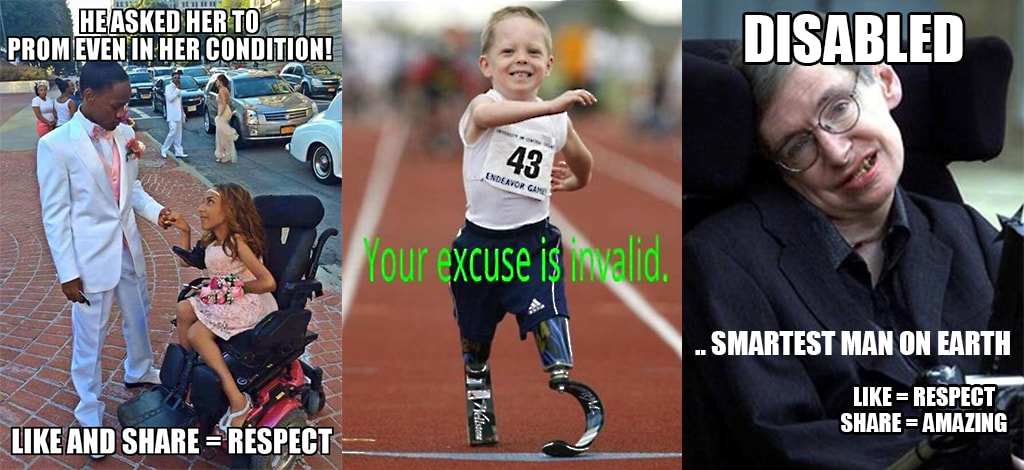
If you’re not disabled, then you probably associate the word ‘inspirational’ with positivity, especially when referring to a disabled person.
Before I became disabled at the age of 16, I had seen plenty of stories of disabled people participating in daily activities that earned them the title of inspirational.
I assumed that being called an inspiration for doing normal things was something most disabled people enjoyed.
I was wrong.
I first learned of the term “inspiration porn” when I listened to Stella Young’s TED Talk. Though she passed away in 2014, her legacy lives on in the disability community thanks to her work.
In her 2012 TED Talk, titled “I’m Not Your Inspiration, Thank You Very Much”, Young talked about being viewed as “objects of inspiration” by able-bodied people.
“For lots of us, disabled people are not our teachers or our manicurists or our doctors,” Young said when explaining the concept of inspiration porn. “We’re not real people. We are there to inspire.”
The term inspiration porn quickly caught on in the disability community, and many disabled people identified with Young’s talk. Years after her TED Talk, Young’s experience is not unfamiliar to many disabled people.
However, the concept is usually foreign to able-bodied people.
After all, with so many advertisements and social media posts that display a disabled person bravely overcoming their disability, many people automatically associate disabled people with inspiration.
As a result of these narratives being repeated over and over, inspiration porn spills into real life.
Grace, a 24-year-old from England who lives with various disabilities, including epilepsy and Ehlers-Danlos Syndrome (EDS), began to use a wheelchair when her chronic pain worsened.
Grace started to use a wheelchair when she was training to become a teacher. When her disability became visible to others, people began to treat her differently.
“I get called inspirational a lot,” Grace says.
“[Starting teacher training] was the start of me being called inspirational for basically anything I did. I once compared it to saying to someone ‘OMG you have a job and you’re over 30? God that is just SO inspirational.’
I found it insulting. If I’d actually done something inspirational, then great — lavish praise upon me! But when you’re calling me inspirational for having a job, you’re suggesting that, in your mind, my life should be sitting at home crying and lamenting.
I am a normal person, therefore it’s not inspirational when I do normal things.”
Dr. Nikola Djordjevic is a physician and the co-founder of MedAlertHelp, a website that compares medical devices and educates patients on what features may be useful.
He explains the reason why many people tend to view disabled people as inspirational for just living life, saying:
“[Disabled people] are sometimes seen as ‘less of a being,’ so they cannot be ‘complete’ — they are expected not to have a family, career, or to be happy. This is why we always admire those who excel in what they do.”
The ‘Good Cripple’
The idea that a disabled person is brave and noble for simply existing plays into the common stereotype that some disabled folks call ‘the good cripple.’
The term ‘cripple’ was often thrown at disabled people in a demeaning or derogatory manner decades ago. Today, however, some disabled people have chosen to reclaim the term.
The ‘good cripple’ stereotype says that disabled people are mild-mannered martyrs who encourage others to be kind and loving — and nothing else.
If a disabled person can be so cheerful and nice, after all, what excuse does an able-bodied person have to not be kind?
Ultimately, the able-bodied person is meant to walk away thinking something along the lines of: ‘thank God I’m not disabled like them, poor thing.’
It’s important to understand that inspiration porn is not the same thing as celebrating a disabled person’s accomplishments.
How Can Inspiration Porn Be A Good Thing?
Ron Blake is a motivational speaker and activist who was diagnosed with PTSD (post-traumatic stress disorder) after he was sexually assaulted.
For the past several years, his daily goal has been to connect with people and to spread awareness about PTSD and sexual assault.
“I have been called inspirational, and it makes me feel good when people say this to me,” Ron tells me.
“It means it is causing someone else to assess their situation and look at it in a different way and encouraging them to find a way to overcome their obstacles in life.
I have been engaged in a cross-country journey for over 11,000 hours over the last 1,423 days to reach a symbolic goal that began with a moment of laughter on a suicidal night. It has involved meeting 30,462 total strangers one by one during that time.”
Ron’s experiences have been highlighted in various outlets, and for a good reason — he is making a difference in people’s lives by helping to educate others and helping those with PTSD and survivors of sexual assault feel less alone.
As in Ron’s case, I believe that disabled people deserve to have their accomplishments acknowledged and celebrated.
Inspiration porn, however, suggests that a disabled person is inspiring only because they are disabled, and often has little to do with a disabled person’s actions.
However, Logan, a lifelong family friend of mine who has cerebral palsy, reminded me that inspiration porn does sometimes serve a positive purpose: bringing awareness to different disabilities.
“[Inspiration porn] is good for disability awareness,” Logan says.
“These stories need to be told. However, I think oftentimes media uses the wrong lens when presenting the story. This perception of ‘disabilities as inspirational’ seems to devalue the right message about people having varying abilities.
The viewer or consumer needs to know the true story and realize they are people first and should be categorized as that.”
Despite the benefit of bringing awareness to different disabilities, inspiration porn as a whole is generally not something most disabled people like to see or experience personally.
For many disabled people, the negative impact of inspiration porn outweighs any positive effects.
Yuria, an Austrian actress with cerebral palsy, offers this advice to disabled people who are used as inspiration porn:
“Remember that you do not owe anyone private information about your life or your health. You don’t have to be nice about it, there is no need to be ‘a good cripple.’
If you find yourself in an uncomfortable situation, it is okay to leave, you don’t have to hold space for these people. You don’t have to educate able-bodied people. Remember that you control the narrative.”
I think it’s fair to say that most able-bodied people don’t go out of their way to make disabled people feel uneasy by using us as inspiration porn.
Likewise, I understand that my experience isn’t universal: there are some disabled people who don’t mind being called inspirational for ordinary reasons.
However, for many of us disabled people, being used as inspiration porn is incredibly unpleasant. As I mentioned earlier, being singled out in this way can be a very lonely and isolating feeling.
Inspiration porn occurs when someone calls a disabled person inspirational just for existing and doing normal things. This is something many disabled people experience frequently and it often makes us feel uncomfortable.
How Does Inspiration Porn Affect Loneliness In Disabled People?

“I understand that what we, as abled people feel — with respect to bodily predictability, energy allotment, and energy consumption — is not what [disabled people] feel or expect to feel.” — Bob
In addition to understanding what inspiration porn is, it’s equally, if not more, important to know how inspiration porn can impact disabled people and the feelings of loneliness they may have.
For those of you able-bodied readers, understand that even though your intention may very well be to praise a disabled person, using a person as inspiration porn rarely feels validating to disabled people.
Yuria, an Austrian actress with cerebral palsy, describes the feeling of being used as inspiration porn as “disgusting, because inspiration porn is essentially someone else objectifying you for their benefit without your consent.”
There’s a reason that inspiration porn often makes disabled people feel so uncomfortable.
“Obvious displays of pity are discouraging and often considered insulting,” Dr. Jared Heathman, a psychiatrist from Texas, tells me.
“While some people [focus on] others having a disability, people are not defined by a singular strength or weakness. We are dynamic creatures with many interests, abilities, and strengths.”
While disabled people often view inspiration porn as insulting, inspiration porn can also lead able-bodied individuals to overlook the nuances of disability.
Many able-bodied people don’t realize that their beliefs were influenced by inspiration porn until a major change affects them or their loved ones.
Bob is a caregiver for his wife and daughter, both of whom have various disabilities.
Prior to becoming a caregiver, however, he says he had “never thought of” the ways invisible symptoms, such as pain or insomnia, could affect a disabled person.
“I didn’t quite understand that someone who was young, upright, walking and appeared to be going about life activities normally could actually be completely floored by said activities for days on end,” Bob says.
Since his wife and daughter became disabled, however, Bob sees disability differently.
“I have a much better understanding of the things that can’t be seen,” Bob tells me.
“I have a better understanding of the emotional burden having a chronic illness puts on the person and their family. I know that what you see is not necessarily what you get.
I understand that what we, as abled people feel — with respect to bodily predictability, energy allotment, and energy consumption — is not what [disabled people] feel or expect to feel.”
Do I Need To Overcome My Disability?
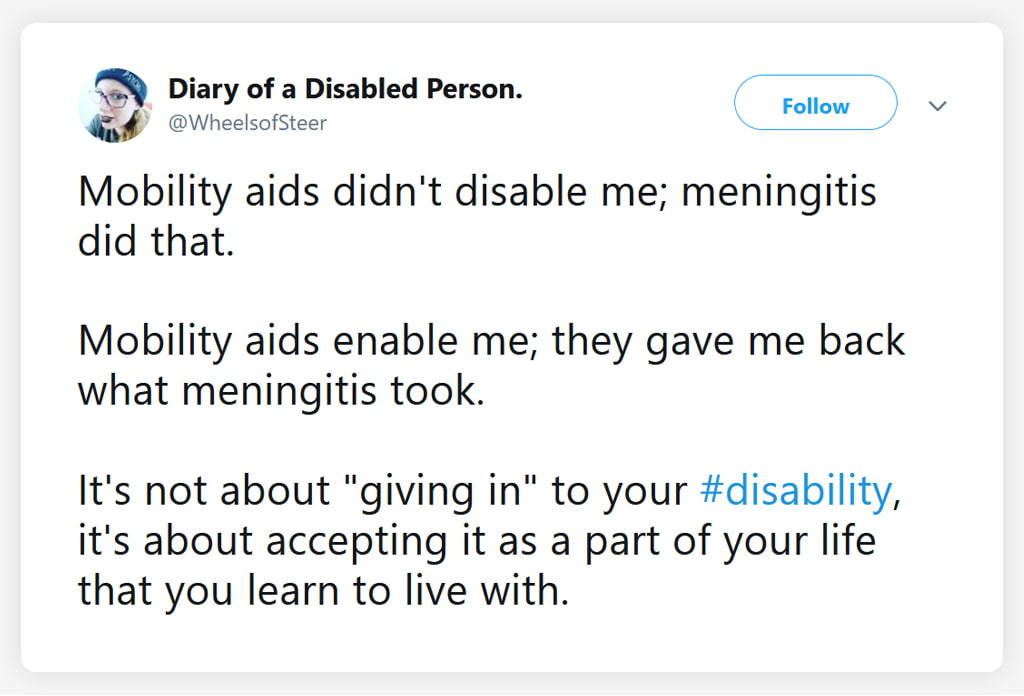
One big way inspiration porn makes it easier to ignore the details of disability is by focusing on a person overcoming their disability.
However, for so many disabled people — myself included — we don’t feel the need to overcome our disabilities at all.
When I was first diagnosed with a common yet rarely-diagnosed condition called POTS (postural orthostatic tachycardia syndrome) at the Mayo Clinic in Rochester, MN, in 2013 at the age of 17, I was initially hopeful that I would, in fact, overcome my condition.
I didn’t think of myself as disabled, in part because I had been able-bodied only a year ago.
Accepting my disability took time; it can be difficult to find meaning in your life during changes like the ones I was going through after my diagnosis.
I had to grieve the life I thought I would live and had to learn to deal with dizziness, nausea, pain, and fatigue on a daily basis. Fortunately, I learned how to manage my time and energy with the help of a great support system.
Grieving my health was hard, but it allowed me to accept my reality as a disabled person.
When I allowed myself to recognize my disability, advocating for myself became easier and I didn’t feel as if I had to hide my symptoms. I began using a cane, which allowed me to get around more easily.
I was disabled, and that was okay.
Because I have accepted myself as disabled, the implication that I have to overcome my disability — something that I have worked to accept as a part of me — can be frustrating.
My disability affects the way I experience the world, and pretending otherwise would make life harder, not easier.
In sociology, there are two models of disability that are used to describe the way society views disability: the social model of disability and the medical model of disability.
The two models are in opposition with one another, as the medical model suggests that disabled people are broken and have to overcome their conditions, whereas the social model of disability suggests that disabled people have to overcome a lack of accessibility — not their disabilities themselves.
Of course, it’s important to understand that everyone with a disability will view themselves differently.
A person with a mental illness may very well want to overcome their disability, and everyone with a disability has the right to view themselves as they please.
Nonetheless, many disabled people tend to hold beliefs that are more in line with the social model of disability.
“I consider society to be unsuited to disabled people,” Grace, the young woman from England, we spoke to earlier says.
“Incredibly poor vision is a disability, but glasses are readily available and so common that no one thinks of it as a disability anymore. If society allowed the same levels of access for every disability, then my use of a wheelchair would be no more of a problem logistically, or socially, than someone who wears glasses.”
While inspiration porn contradicts many disabled people’s lived experiences and frequently uses the medical model to view disabled people, inspiration porn can also involve invading someone’s privacy.
When someone praises me for doing something perfectly average, I feel as if I have to explain that what I’m doing isn’t really a big deal.
This unwarranted praise can make me especially uncomfortable when a person talks to me, a 24-year-old, like a child.
Telling my medical history to a complete stranger in order to correct their assumption is, to put it mildly, awkward as hell, and I’m certainly not the only disabled person to experience this.
What Does Inspiration Porn Actually Look Like?
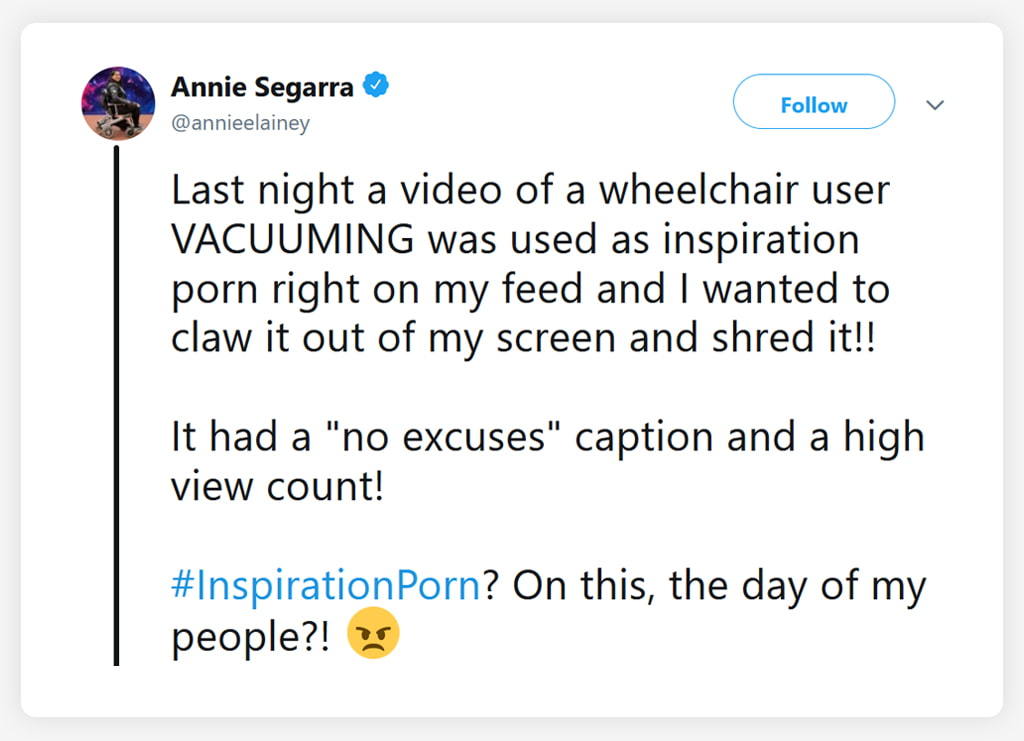
Phillip, a 28-year-old from Alabama, has cerebral palsy and is Hard of Hearing. He has a passion for sports and loves to play wheelchair basketball.
So when he was working out in his college gym, it was no big deal — until someone else thought it was.
“This individual walks up and asks how my workout is going. Not atypical at all, and the conversation continues and he asked my name and if I was on social media,” Phillip says.
“This should have been a red flag, but hey, people meet friends everywhere these days. I gave it to him and we parted and I continued working out.”
Phillip thought that this was the end of his interaction with the stranger until later that evening:
“I was working on homework and noticed a Facebook notification tagging me in a post. I started reading it, and it just felt surreal. The individual from the gym had posted the typical inspiration porn post that said something like ‘I was working out and saw this guy in a wheelchair. He was crushing it. So inspiring!’”
Upon reading the post, Phillip was shocked.
He and his friends commented on the post, explaining that the post wasn’t an accurate representation of disability, or of Phillip, and asking for the post to be deleted.
Though the guy from the gym was insistent that he was ‘just trying to be nice,’ the post was eventually removed.
“My reaction to the post was a combination of embarrassment and laughter of sorts because my friends know that I loathe inspiration porn and I had fallen into it,” Phillip says.
“The jaded side of me felt like the guy was just being friendly because of the inspiration porn angle. He really didn’t care about being friends in any way, just that I ‘inspired’ him. That experience, along with others, has made me more aware and wary of stories that non-disabled people typically gravitate towards as it relates to disability.”
Even when inspiration porn is intended to highlight a disabled person, it usually ends up highlighting the perceived struggles of a person’s disability.
Inspiration porn can make many disabled people feel as if our stories are no longer our own, and suddenly, our sole purpose is not to live our lives — but to make able-bodied people feel happy.
When able-bodied people hold onto beliefs that are influenced by inspiration porn, this can result in the infantilization and dismissal of disabled people and our experiences.
What Are Other Common Perceptions And Assumptions About Disabled People?
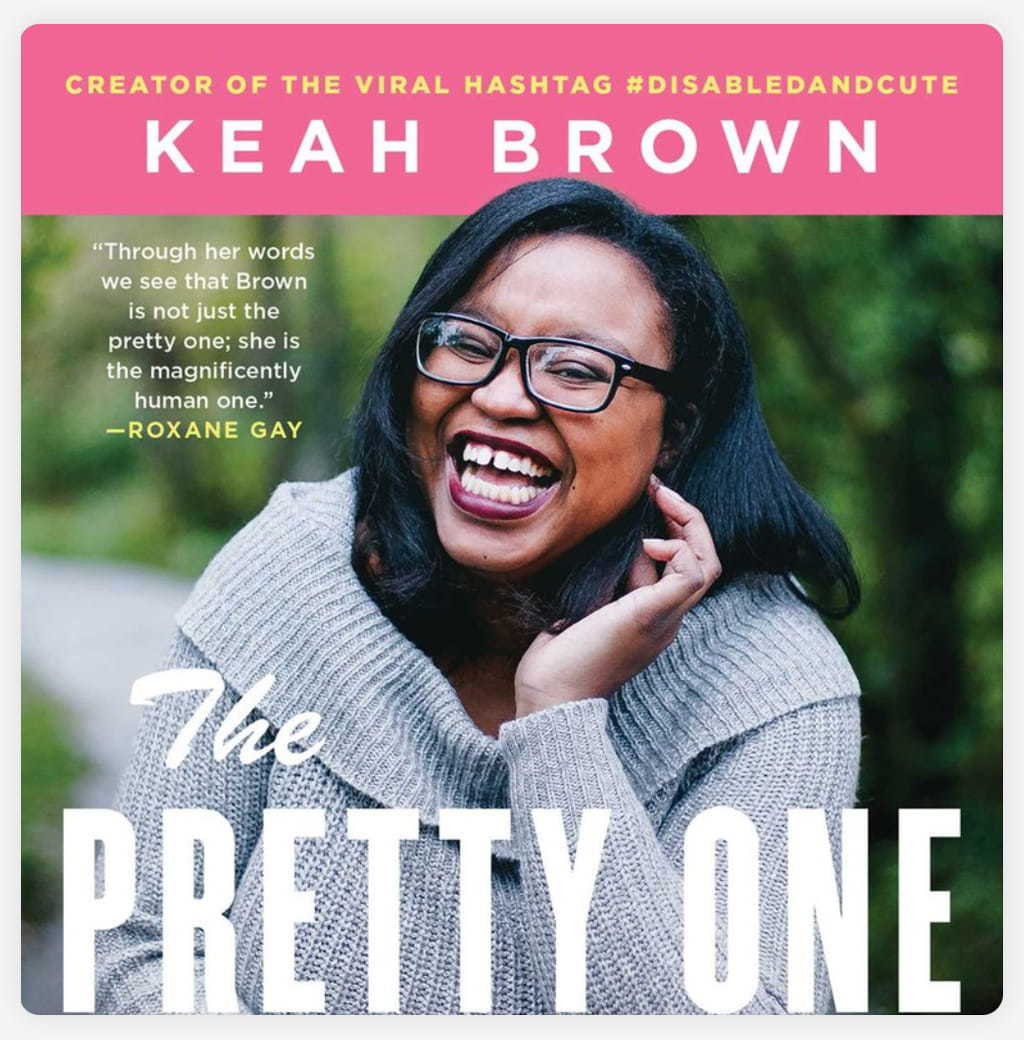
The idea that disabled people are inspiring or brave for participating in life isn’t the only harmful assumption that able-bodied people often make about disabled people.
Taking what I know from others’ experiences and my own, I was able to categorize four additional perceptions or assumptions that frequently have a negative impact on disabled people.
The “You Don’t Look Sick” Assumption
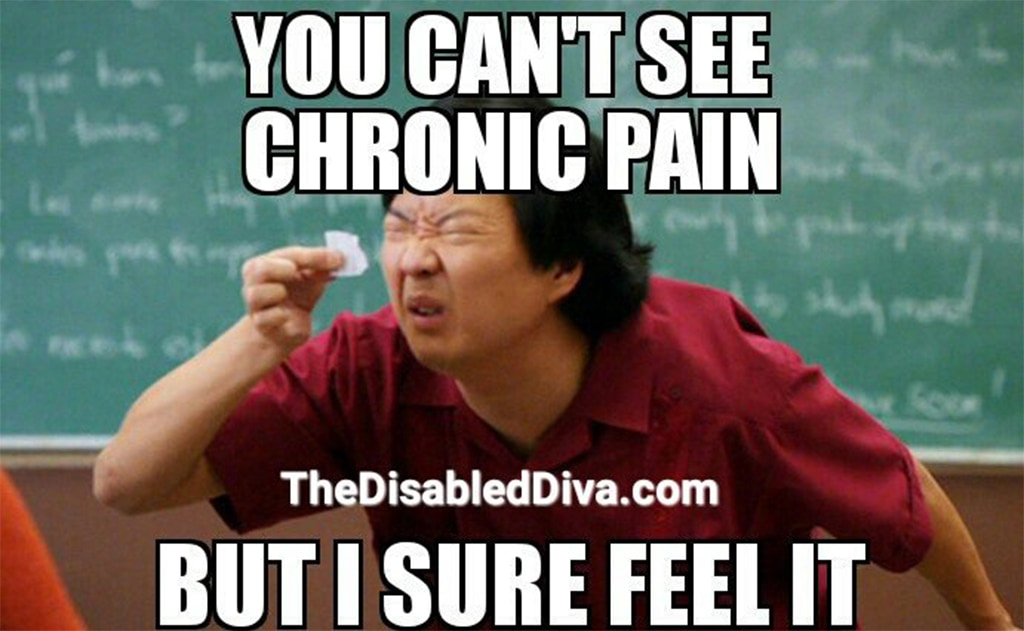
When I hear the words “you don’t look sick,” I automatically tense, especially if the person saying this is a doctor.
I bite back a sharp remark and awkwardly smile at the person who intended to give me a compliment, but instead, has me feeling on edge.
When I first became sick, I thought that doctors would be able to diagnose me quickly. Growing up, I had the privilege of believing that the healthcare system would take care of me.
When doctors couldn’t diagnose me, however, my faith in the medical system shattered.
“You don’t look sick,” said a doctor who had barely performed anything beyond a few basic tests on me. “You should see a behavioral therapist for your symptoms.”
“You don’t look sick,” said the doctor who examined me briefly and then suggested that I, at 17, could not accurately take my own temperature. “High school is a stressful time. You should stop seeing doctors.”
When someone says a disabled person doesn’t look sick, it’s hard for many disabled people not to wonder if this person is questioning the validity of their disabilities.
To help explain the difference between able-bodied people and disabled people who “don’t look sick,” author and disability advocate Christine Miserandino created The Spoon Theory.
This theory is well-known and frequently used in the disability community, and it helps to explain how a person’s appearance doesn’t always equate to a sense of wellbeing.
If you mean to say “you look nice today,” then please, say this instead and spare me or your disabled friend the anxiety of wondering whether or not you think our disabilities are real.
The “You’re Too Young/Attractive To Be Disabled” Assumption
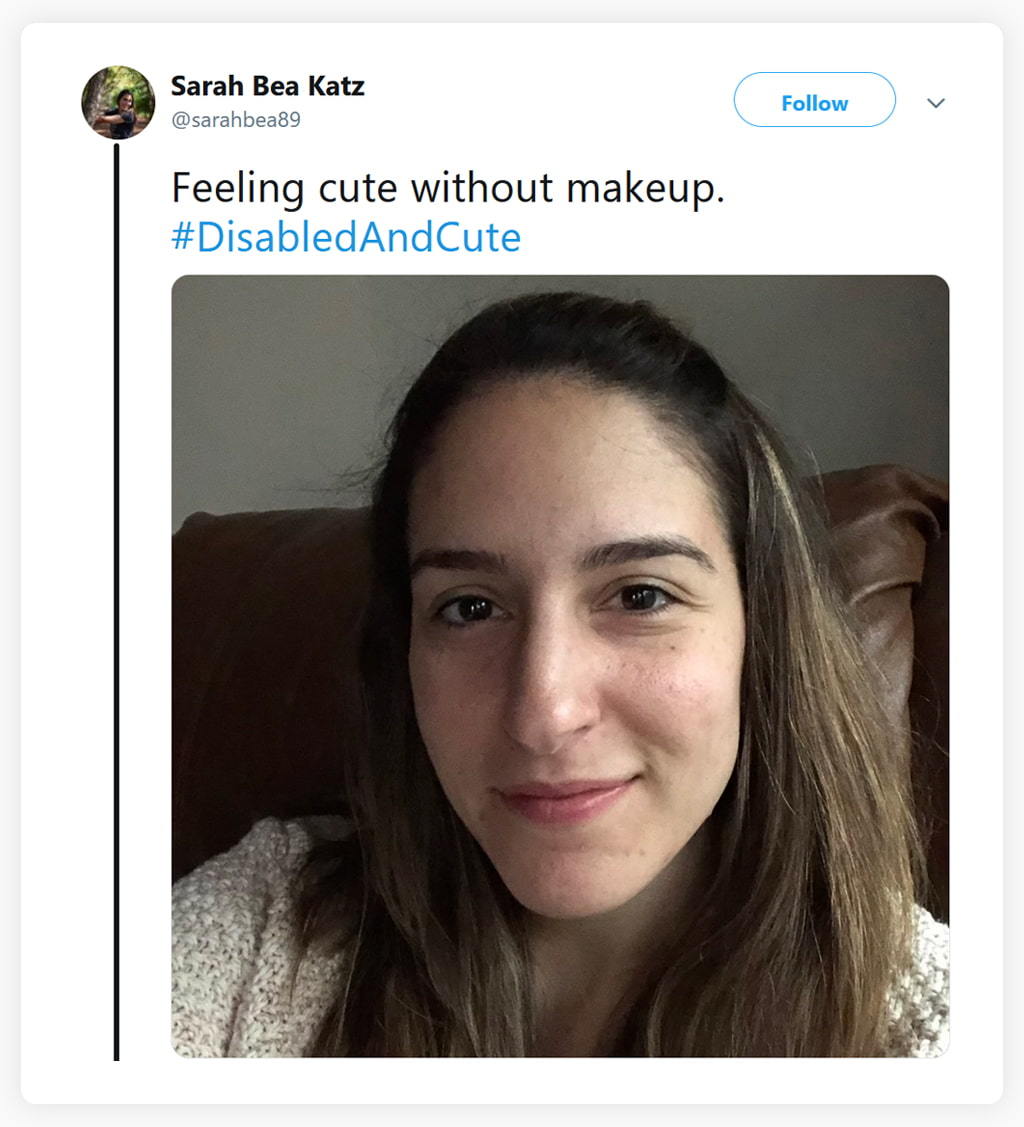
When an able-bodied person sees a young or attractive person using a mobility aid or parking in an accessible (often referred to as ‘handicap’) spot, disabled people often end up hearing “you’re too young to use a wheelchair!” or “you’re too pretty/handsome to be disabled!”’
Similar to the “you don’t look sick” comment, comments suggesting that a person is too cute or young to be disabled can cause a disabled person to wonder if the validity of their disability is being questioned.
As a result, a disabled person may feel as if they have to prove their disability to another person.
Comments about a person’s age or looks can make people self-conscious of their appearance.
As with inspiration porn, I, along with many disabled people, know that comments like these aren’t meant to be degrading.
However, comments like these do promote harmful stereotypes that suggest disabled people can’t be attractive or young, and that a disabled person must have a certain look — that look being elderly and/or unattractive.
Growing up, I had the unique experience of hearing stories from my grandma about her childhood with polio and living with post-polio as an adult.
When she was affected by post-polio years after her initial polio diagnosis, walking became increasingly difficult. Eventually, she decided that using a mobility scooter would be the best way to get around.
However, many people didn’t understand why my grandma was using a mobility scooter.
She looked normal, after all.
Men would often ask my grandma “do you want to race?” or “how fast does that thing go?” They seemed to think that she didn’t really need a mobility scooter and thought that she was just using it for fun.
“I wish I had one of those!” men said to her more times than she can count.
My grandpa was always ready with a response. “If you want to give up your legs, then you can get one!” he’d say.
“That usually got people to stop,” my grandma says.
The reason many people are surprised to see a disabled person who is younger or attractive stems from the unconscious belief that disabled people aren’t normal.
In reality, disabled people make up roughly 15% of the world’s population according to the World Health Organization (WHO).
Disability doesn’t discriminate, and since disability can intersect with other identities (race, sexual orientation, etc.), anyone can become disabled.
An accident or acquired illness can turn an able-bodied person to disabled in an instant. Otherwise, most people, if they live long enough, will become disabled.
Understandably, most able-bodied people don’t want to think about becoming disabled.
Disability forces people to think about their mortality, and people frequently think that disability isn’t something that can happen to them.
Since disability itself is often an unattractive idea, it’s not a far leap for some people to assume that disabled people are therefore only unattractive.
The idea that a disabled person can be easily spotted due to their age and perceived beauty makes disability seem like something that is inherently negative and scary.
Even though disability itself can be scary for people to experience, actual disabled people should not be feared or looked down upon.
While some disabilities are visible, there are a multitude of invisible disabilities, and it’s unreasonable to think that you can always tell if a person is disabled.
In 2017, author and disability activist Keah Brown created the hashtag #DisabledandCute on Twitter to fight against the idea of disability having a certain look.
Today, you can search the hashtag to find hundreds of disabled people, of all ages and from all demographics, proudly showing themselves to the world — disability and all.
The “You’re Incapable” Assumption
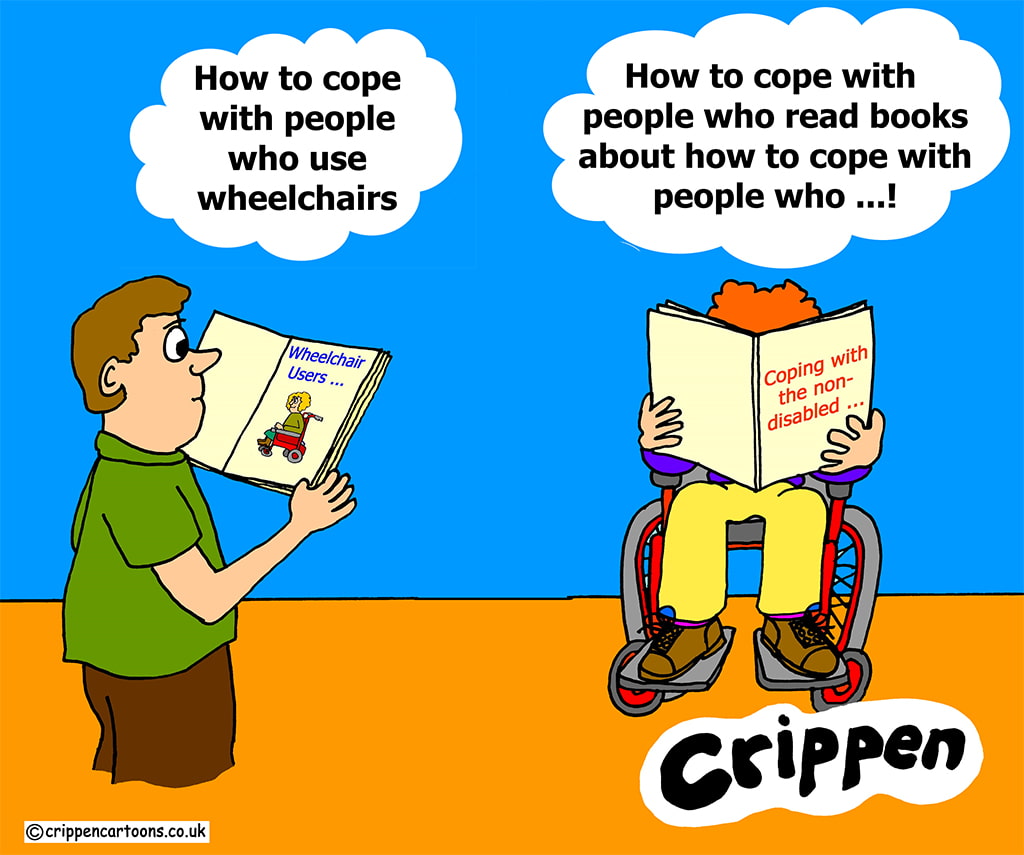
On the opposite side of the spectrum of inspiration porn is the assumption that disabled people are incapable of functioning independently in any capacity.
This assumption can manifest in various ways.
Though many well-meaning people may think they are helping a disabled person, their actions can lead to a disabled person feeling out of control.
“Existing in public as a disabled woman is a wild ride,” Yuria, an Austrian actress with cerebral palsy, says. “People push my wheelchair without asking or making their presence known.”
Beyond the frustration of feeling out of control, trying to help a disabled person who does not want or need help can also cause real harm.
“Ask before providing aid or help,” Phillip, a 28-year-old from Alabama, says.
“Do not under any circumstances grab or touch someone, their mobility aid(s), or other equipment without first receiving clear, explicit, incontrovertible consent to your actions. If consent is given, listen to the disabled person and how they want it done. Doing otherwise might risk injury, harm, or endangerment.”
Assuming that a disabled person absolutely needs help can be humiliating and dangerous, and can easily underestimate a disabled person’s capabilities.
Certain medical professionals unknowingly fall into the trap of underestimating their disabled patients, too.
Kai is a CNA (certified nursing assistant) who has worked in rehabilitation, long-term care, hospice, and group homes.
Though Kai lives with several disabilities himself, working with disabled people made him realize what misconceptions he previously held about disabled people.
“Before being a CNA I honestly thought people with physical disabilities couldn’t do most things,” Kai says.
Since working as a CNA, however, he says, “I’ve seen that [disabled] people can do pretty much anything. I’ve learned to connect better with my [patients] and to be patient. A good relationship with people can change everything.”
When medical professionals assume that their disabled patients can’t speak for themselves, this can result in the dismissal of a patient’s voice.
“Doctors often talk to me instead of my wife,” Bob, a caregiver to his wife and daughter, tells me. “She is sometimes treated like my child.”
The child-like treatment of disabled people can affect multiple aspects of a disabled person’s life.
The assumption that someone is incapable because they are disabled can cross into discrimination easily.
When Logan, a childhood friend of mine from North Carolina, applied for his driver’s license in 2014, he was surprised to find that, despite his doctor saying that it was perfectly safe for him to drive, the North Carolina DMV would not grant him his license.
“Throughout the process, there was no reason why I wasn’t granted [my license],” Logan says. “My family and I were going in circles with DMV officials. It was frustrating. I felt like my rights were being violated based on assumptions.”
Logan, along with several other individuals who had been discriminated against due to their disabilities, filed a lawsuit against the North Carolina DMV.
In 2016, the lawsuit was finally settled with the state agreeing that people with disabilities should not be automatically required to receive additional assessments.
Whether we’re in doctors’ offices, in public, or at the DMV, the majority of disabled people I spoke to agreed that having others underestimate them was demoralizing, isolating, and frustrating.
A simple solution to avoiding this mistake? Ask if a person needs help, and if they don’t, trust them and their abilities.
“Othering” People With Disabilities Can Make Their Loneliness Worse
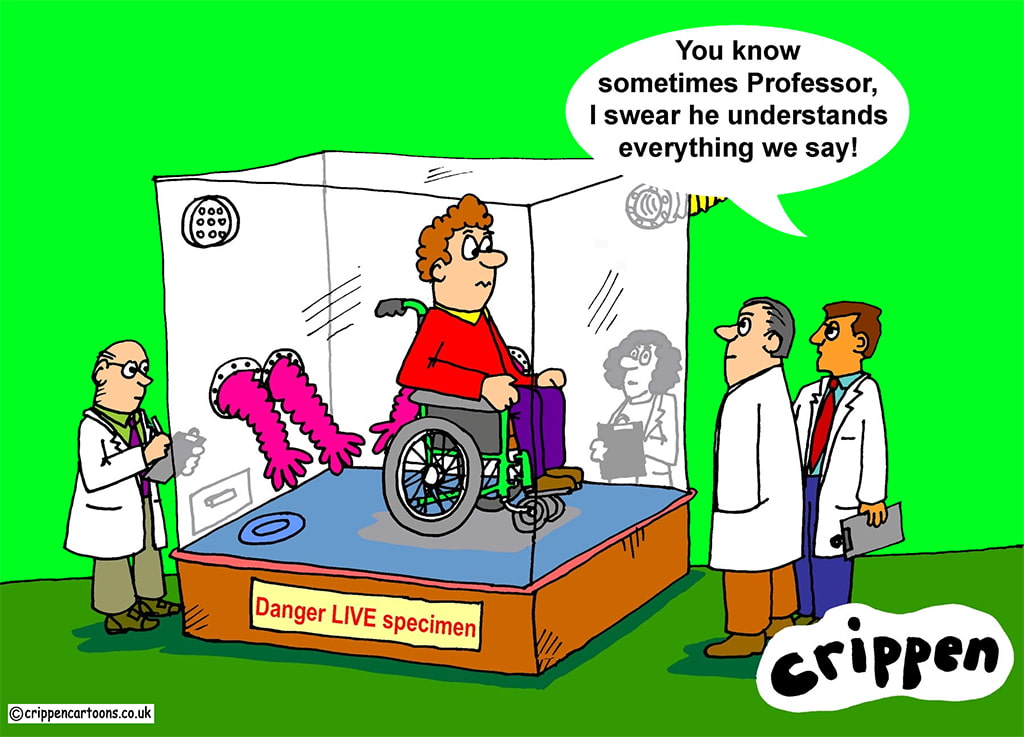
Another common perception of disabled people is that we are inherently different, and this can cause us to be “othered” by able-bodied people.
Like inspiration porn, othering frequently involves pity.
However, unlike inspiration porn, othering focuses on perceived negative differences and can lead to feelings of brokenness and loneliness.
Situations that cause someone to feel different from those around them can leave a person feeling emotionally lonely and isolated.
When Grace, a young woman from England I spoke to previously, began to use a wheelchair, she says that people began to view her differently, explaining:
“People often weren’t sure of my communication skills or intelligence before talking to me, based on my use of the wheelchair. They often addressed the person who was with me [instead of addressing me].
That made me feel, for want of a better phrase, looked down on. I felt that people viewed me as some sort of pariah — my entrance into a room caused everyone in there some level of anxiety.
When a body, let alone a female body, doesn’t conform, I’ve found it makes people deeply uncomfortable, and the person that I am on the inside is neglected. It feels, in a way, like erasure.”
Othering affects more than just disabled people and can increase divisiveness between people perceived to be in the norm and the perceived others.
In regards to people with disabilities, othering can make us feel increasingly isolated and lonely.
Othering can also strengthen stereotypes about disabled people — and able-bodied people are not the only ones who internalize stereotypical messages.
Dr. Catalina Lawsin is a clinical psychologist who specializes in working with patients with chronic illnesses. When asked about why othering occurs, she says:
“The ‘Me vs. Them’ mentality cuts across all differences, including the level of physical functioning. Cognitive appraisals occur when encountering others to try to categorize [other people] as the same or different to efficiently decide if there’s a threat.
Unfortunately, physical disabilities are often apparent and seen as different. It takes a moment to pause and challenge these feelings of threat to normalize others and perceive them as equals.
Unfortunately, our brains are wired to work on autopilot and individuals not often exposed to people living with disabilities don’t take pause to heighten self-awareness.”
Before I became disabled, I had never truly experienced being othered.
As an able-bodied young white woman from a middle-class family, I was considered to be in the “in” group of society.
When I became disabled, especially when I started using a cane and became visibly disabled, things changed for me.
I could feel people’s stares wherever I went. People were more hesitant to talk to me and avoided eye contact. When parents tugged their children away from me, I felt an ache in my chest.
Sure, these people weren’t trying to make me feel ostracized or different, and most people were trying to be polite: that didn’t change the feeling that I had a sign slapped on my face that said ‘pity the poor crippled girl.’
Despite being othered, I have been privileged to have access to most of the world after becoming disabled.
I have a supportive family and friends who understand that my disability is just a part of me.
Over time, I’ve learned to ignore the stares and give quick, concise responses to any rude questions or comments. I smile at everyone and remind myself that people mean well most of the time.
My identity as disabled is intertwined deeply with my other identities, and I know that if my race or socioeconomic status changed, the othering would become more intense, and perhaps more malicious in some instances.
I’m not naive enough to think that othering certain members of society can be stopped overnight.
However, even though othering is a widespread issue, I’ve realized that change can start when people look for humanity in all people, and when we, as “others,” tell our own stories.
Here is a video on othering that talks about it from a political and societal scope:
How Can Able-Bodied People Make Life Easier for Disabled People?
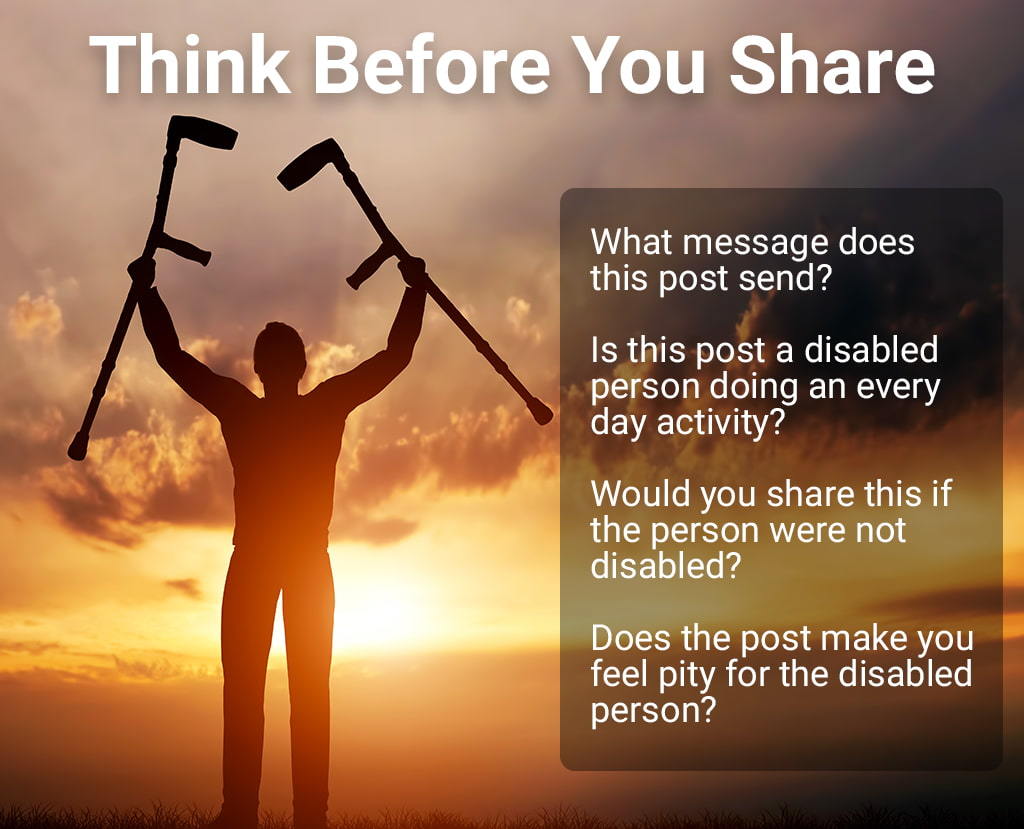
It’s incredibly helpful for an able-bodied person to know what mindsets or assumptions can make life hard for disabled people.
However, worry about upsetting someone can cause able-bodied people to avoid disabled people entirely, especially if they don’t know what to say.
Focusing on a few simple concepts, however, can help to make your interactions with disabled people more pleasant for everyone involved.
Think Critically About What You See And Share In The Media
Social media is a huge part of our world today, and when you see what looks to be a feel-good post about a person with a disability, your first instinct may be to share the story.
With how terrible the news is, it’s nice to see a cheery story, right?
However, by sharing a post, you may be spreading a story that the disabled person in the post didn’t want to share, such as in Phillip’s case that we discussed earlier.
He describes feeling “mortified” when he saw that he had been used for inspiration porn, and though everyone who had liked and shared the post probably thought nothing of it, feeling objectified because of his disability was embarrassing to Phillip.
If you want to avoid promoting harmful stereotypes about disabled people, ask yourself a few questions before sharing content that involves a disabled person.
What is the message? Who does this post benefit? Is this post about a disabled person’s genuine accomplishment, or is it pitying or infantilizing a disabled person? Is the disabled person in this post being talked to or talked about?
In many cases, you may not know the answer to all these questions. In fact, you may feel especially confused if the disabled person in question doesn’t mind being used as inspiration porn.
Karla Culbertson, a 35-year-old writer with cerebral palsy, shared her perspective about being called inspirational in The Mighty in January of 2019. She said:
“In certain situations, it does bother me that [disabled people] are seen as superhuman,” Karla says in her article. “However, if I am praised for being an inspiration because of an important impact I had on someone else, I do not mind. When I hear the words ‘you’re an inspiration’ after someone has read my writing, I can only respond with thankfulness and gratitude.”
Although many disabled people, at least in my personal experience, don’t want to share or be used as inspiration porn, this isn’t always the case.
Though I personally avoid sharing inspiration porn under any circumstances, there’s room for debate among the disabled community about disabled people who willingly participate in inspiration porn.
Everyone has the right to tell their own story the way they want to, after all.
However, an able-bodied person probably doesn’t want to enter this debate.
If the disabled person at the center of the post hasn’t endorsed the post itself, you probably don’t want to share it.
If you are still feeling unsure about sharing a post, it’s usually best to err on the side of caution. Sharing a post that dismisses disabled people’s reality can be hurtful, but choosing not to share a post doesn’t harm anyone.
Respect Our Space And Privacy
Everyone appreciates being shown genuine respect, including disabled people.
A simple, easy way to show respect for disabled people is by respecting both our space and privacy.
Yes, you may be tempted to ask us questions. You may be tempted to stare, and you may also be tempted to grab hold of our mobility aids in an effort to help us.
However, you don’t have to act on your first impulse.
Instead of jumping into action, make sure you’re respecting a person’s personal space and privacy. View a person’s mobility aid as a part of them, and respect a disabled person’s agency.
Talking to a friend or acquaintance about their disability isn’t necessarily off the table. Before making a comment or asking someone to explain details about their disability, however, take a step back.
Consider whether or not it’s appropriate to ask a person, especially if that person is a stranger, a detailed question about their disability. Ask yourself whether or not the comment or question could make the person you’re talking to feel inept.
Angie, an academic reference librarian with impaired vision, explains that people often don’t understand her disability, and as a result, she’s heard various inappropriate comments.
“People don’t seem to understand that visual impairment is a range,” Angie says.
”They either assume I can’t see or that I see just fine. I was helping a student once and explained I needed to move the monitor so I could see it. He suggested that being a visually impaired librarian was like being a cop and objecting to being shot at!”
The way you phrase a comment or question can have a big impact on how it comes across. If you approach the topic of disability with sensitivity and kindness, you’re far more likely to receive an honest response.
When it comes to offering assistance, you shouldn’t be afraid of asking disabled people if they need help.
However, don’t be surprised if your help isn’t needed. Understand that your perception of what someone is capable of doesn’t necessarily align with someone’s actual capabilities.
Just because we don’t need help doesn’t mean we don’t appreciate the offer, though. When a person offers to help and respects our response, whether it’s a ‘yes, please’ or a ‘no, thank you,’ the world feels a little kinder.
Teach Your Children About Disabilities
If you have children or have a child in your life, you probably know that kids love to ask questions.
This desire to learn doesn’t stop when it comes to disability, and teaching children about disabled people — and anyone else who is different from themselves — helps to create a more inclusive future.
It makes sense that a child who has never seen or interacted with a disabled person would have questions. Why is he in a chair and what does it do? What happened to her legs? What is that walking stick for?
Most disabled people are usually fine with answering children’s questions. After all, kids are genuinely curious and they normally don’t offer platitudes or pity as some adults do.
Even though their questions may be blunt, most of us want to make disability less intimidating for children. For a child, talking to disabled adults can make it easier to understand that disability isn’t scary.
There are plenty of circumstances where you may not want your child to go up and start talking to a stranger, however.
Fortunately, you can normalize disability by reading age-appropriate books with your child that include characters with disabilities.
Disability Studies Quarterly, a journal that focuses on disability studies, found that children’s literature helped kids identify similarities between themselves and disabled people.
As a result, kids were able to feel more empathy and had a better understanding of disabled people.
Teaching kids at an early age that not everyone’s bodies work the same can make a huge difference in disabled people’s lives.
Whether your child befriends a new kid at school with a disability or interacts with a teacher with a disability, having an understanding of disability can give your child a better understanding of the world and can make disabled people feel included and accepted.
Remember We’re Human
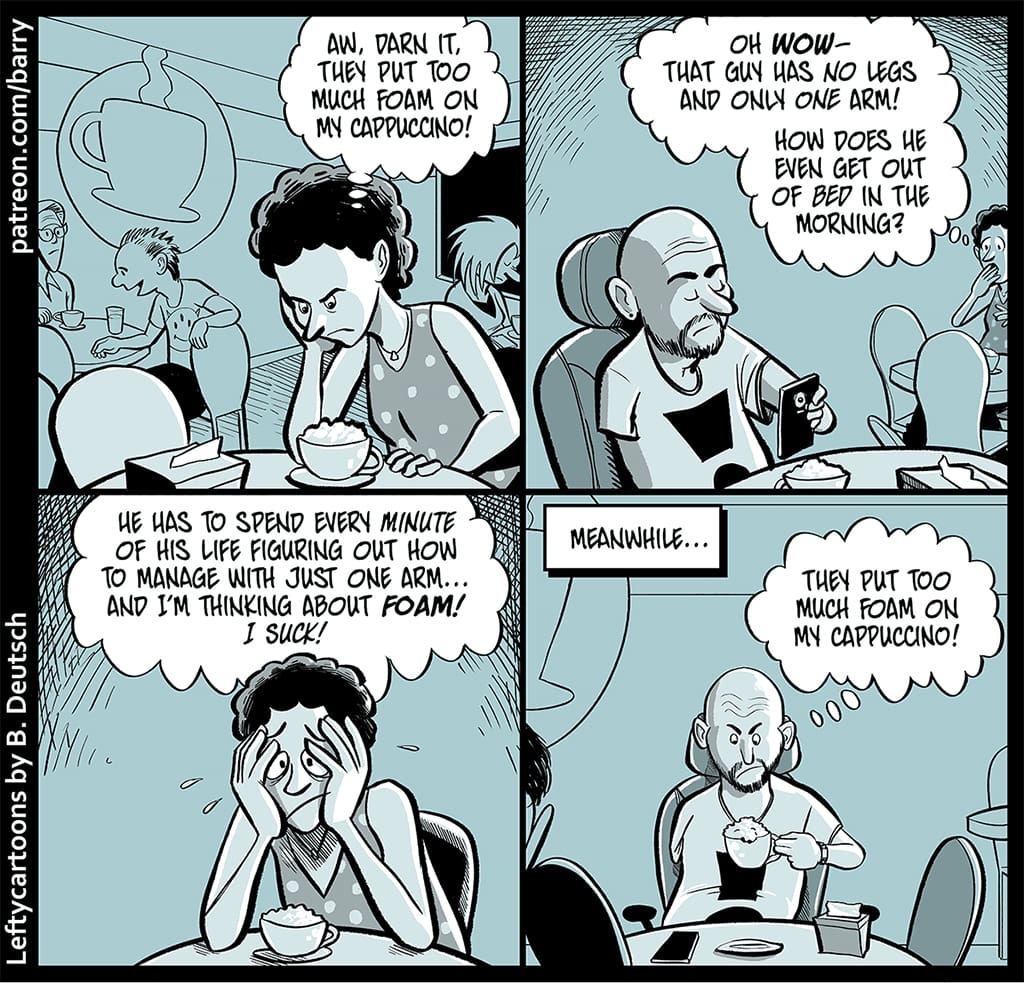
Although this may seem like an obvious piece of advice, it’s worth mentioning that, when you interact with disabled people, remember that we’re human, too.
This tip can be especially helpful if you feel nervous about interacting with a disabled person. Don’t let yourself get so wrapped up in thinking about a person’s disability before you even say ‘hello.’
“We are normal people!” Grace, from England, says. “We laugh! We make jokes! Many of us have jobs and relationships! You can talk to us as though we’re an average Joe, and you might even find we have something to say.”
Phillip, who has cerebral palsy, adds:
“Don’t assume that disabled people’s lives are drastically different from non-disabled people’s. We can go to college and graduate, live independently, work typical jobs, have families, friends, and romantic relationships.”
Having empathy for others is hugely important, and it can help you understand a person’s experiences better.
Carol, an author from Atlanta, says, “I have to admit, I have been impatient when trying to get around a disabled person [in the past].”
Carol’s perceptions changed, however, when she had to temporarily use a wheelchair after breaking her ankle in a fall. She said:
“I got a taste of what disabled people experience daily. Before my injury, I never realized how heavy doors were. It was hard to acknowledge how many people failed to hold the door for me when I was using the wheelchair or crutches. I suspect they thought getting out of my way was best, though I’m being charitable.”
Though you may have more empathy for disabled people if you’ve had to use a mobility aid due to an injury, you don’t have to have this experience in order to be empathetic.
Whether you’re frustrated that a person is taking a little while to navigate an unfamiliar area with a wheelchair or you’re confused as to why a disabled person is refusing help, take a moment to approach the situation with thoughtfulness and patience.
Know that when you meet a person with a disability, you may slip up and mistakenly say something inaccurate or offensive — that’s frequently part of the learning process if you’ve never had a relationship with a disabled person.
Just make sure you’re willing to apologize for and learn from your mistakes.
Our disabilities are often part of us, but we are multifaceted people with unique personalities, hopes, pet peeves, and dreams, just like anyone else.
When you talk to a disabled person, the same basic rules of socializing apply: be kind and be open to forming new relationships.
Don’t avoid interacting with disabled people just because of our disabilities! Just by avoiding making assumptions, thinking critically and being respectful, you can make a disabled person’s day much simpler.
Closing Thoughts
The concept of disability is complex and isn’t always as straightforward as you may first think.
Though you may have good intentions when using a disabled person as inspiration porn, the concept of inspiration porn can take away disabled people’s ability to control our own narratives.
Likewise, other common perceptions or assumptions about disabled people can hurt disabled people emotionally, exacerbate our loneliness, and can actually make life harder for us.
When I asked the disabled people I interviewed to share advice for able-bodied people, almost everyone had the same answer: avoid assumptions.
“I’d tell non-disabled people plenty of things, but most of them boil down to do not assume,” Phillip says.
Changing your perceptions about disability takes time. Even if you are disabled, you may be surprised to realize what assumptions or stereotypes you’ve internalized.
Whether you’re disabled or able-bodied, however, analyzing your beliefs about disabled people and disability is a worthwhile endeavor.
Ultimately, when you avoid using others as inspiration porn, avoid making hurtful assumptions, and take steps to make life easier for disabled people, we are able to control our own narratives and share our own stories.
Editor’s Note: This article is part of The Roots Of Loneliness Project, the first-of-its-kind resource that comprehensively explores the phenomenon of loneliness and over 100 types we might experience during our lives.
Find Help Now
If you’re struggling with loneliness as a disabled person, we’ve put together resources to meet you wherever you are — whether you want someone to talk to right now, or are looking for longer-term ways to help ease your loneliness.
- Suicide Prevention Lifeline: 1-800-273-TALK (8255); Deaf or hard of hearing dial 711 before the number or connect via online chat
- Resources & Emotional Support For Loneliness
- Volunteer & Pet Adoption Opportunities



